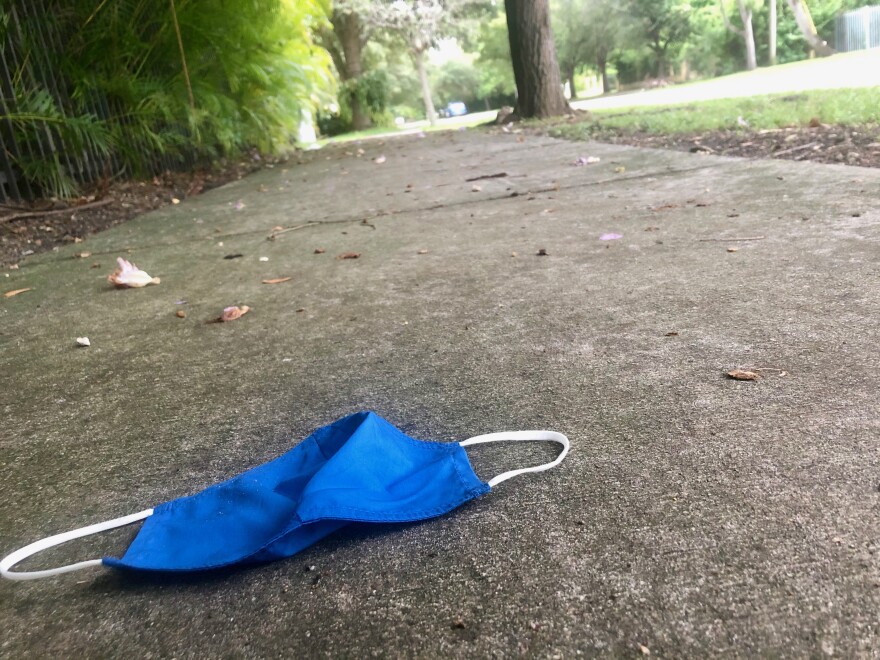An electrician who wears protective suits. An extermination service coordinator who leaves her iPad with a customer and walks away. A resturant manager who has turned away diners not wearing masks. And a nurse treating COVID patients who, off the clock, gets cursed out reminding people in public to wear masks.
These are some of the practices folks shared with WLRN Connects as they work with and talk about the protective measures used to slow the spread of COVID-19.
In these uncertain times, you can rely on WLRN to keep you current on local news and information. Your support is what keeps WLRN strong. Please become a member today. Donate Now. Thank you.
This is the beginning of the fifth month of different emergency orders, closures and restrictions. All the rules can be confusing — what can you do, what’s reopened, what has had to close again. In the past week, the public health messaging can be boiled down to the basics: wear a mask, stay socially distanced, and wash your hands.
"It's not okay to take your mask off in front of me. Thank you very much," Miami-Dade County Mayor Carlos Gimenez said last Monday. "You may have the virus. As a matter of fact, I may have it."
A few hours later, he appeared with Gov. Ron DeSantis for another press conference at Jackson Memorial Hospital. The governor did not wear a mask.
Standing next to him, the Miami Dade mayor's message was "maintain social distancing. Wash your hands. Don't touch your face with your hands." It did not include wearing a mask even though the mayor himself was wearing one when he was not speaking.
Wearing a mask in most public places has been the rule for weeks in South Florida. Now, you can be fined between $50 to $500 for not wearing one, depending on where you are.
"I saw somebody in a gas station — about 10 people. It was a convenience store. [They] were not wearing masks. The other people were. I said, 'Hey, you guys really need to wear masks.' A woman came up to me and yelled at me, 'You don't tell me what to do!' I go, 'Well, actually, yes, I do.'" — caller Steve, a nurse in Miami
Christi Gordet of Coral Gables said she found herself trying to reinforce one-way aisles at a grocery store. "Another shopper was totally ignoring the one-way lane," she said. "I pointed to the floor and told them, 'Look, there are arrows on the floor. You're only supposed to go in one direction.'"
She said her fellow shoppers dismissed the directions. "The rules are there for a reason," she said.
For a lot of people, working from home just is not an option. And some people work inside other people's homes.
If your air conditioner goes out or you need a plumber or you’ve boosted your Internet so you can keep working from home more easily — you may have invited a stranger into your home to help you.
"The first thing that we think about is how we're going to approach," says Kirk Lewis from Pro Electrical Solutions in Miami. "Sometimes some people are very nervous of you getting inside their house. But we re-train our employees on COVID and how to handle situations like that."
Lewis and his colleagues get nervous too, he says. "Because you never know what might happen when you go. We never know what we're going to encounter when we go inside there, if there's a person that has the virus and [they] don't know about it."
"I could change my gloves three or four different times just for one customer," says Megan Spiewak with Truly Nolen Pest Control.
Now that it's no longer safe to have a conversation with a customer in close proximity, Spiewak says, "If there's something I need to show them on my iPad, I'll sit it down on the counter, step away, and then they could walk up to it. … That way they can still see the videos and they can still be informed while maintaining social distancing."
"Even last night as were driving down Collins Avenue, there's literally throngs of people in front of restaurants without masks. It's sort of so cavalier that it just blows my mind." — caller Marcos, a psychotherapist in Miami Beach
Restaurants and bars have been a big focus of public health rules aimed to slow down the spread of COVID-19. They were shut down for several weeks, and then reopened with limited capacity.
Then, three weeks ago the state closed down drinking at bars, and in South Florida, some restaurants can only serve food outside. And if dining rooms are open, there are limits. For customers, and especially for workers, it's been a lot to keep track of.
Zack Foley is a restaurant manager in Fort Lauderdale.
"With the guests, it's everything from total understanding and acceptance to, you know, 'How dare you? I'm never coming back,'" he says about reactions to his restaurant's rules that people they must wear a face covering except when sitting at their tables, even if they're just standing up from their chairs.
"The first step obviously is, you know, very nice. You know, I do apologize, but if they refuse that, we get a little bit more stern." Being stern with customers is a whole different realm, says Foley. "This is not something I'm accustomed to at all. I've been in this industry over twenty years and, you know, you'll always bend over backwards for the guest."
Correction: In the broadcast of WLRN Connects, we referred to Kirk Lewis as Lewis Kirk. We apologize for the error.







